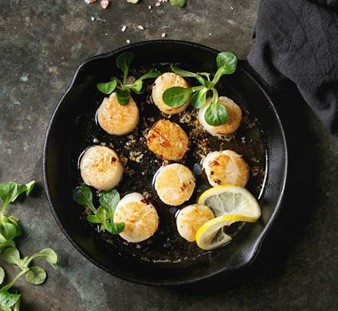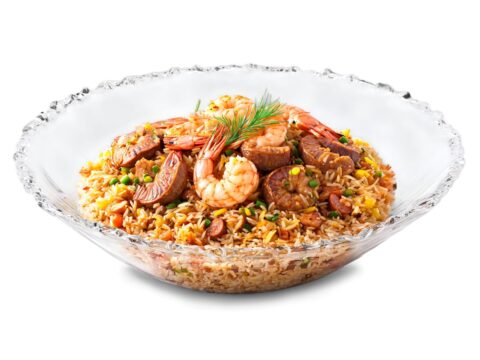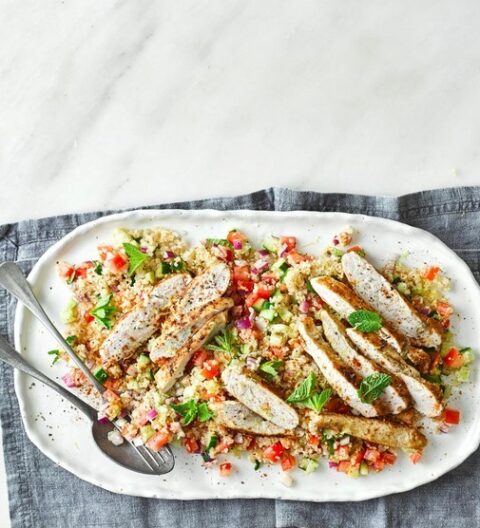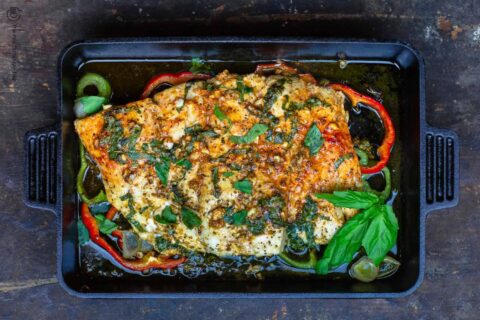
Combining the health benefits of best extra virgin olive oil with this incredibly healthy seafood.
Seared scallops are a great dish to prepare when entertaining but are also simple enough that they can be prepared for an easy weeknight meal. Sea scallops are a healthy, quick-cooking, and delicious seafood dish that makes a great companion for extra virgin olive oil.
The recipe is not complicated and focuses on proper technique to prevent overcooking the scallops which will make them rubbery. This version also uses olive oil instead of traditional butter basting in order to reduce saturated fat and increase monounsaturated fats.
Scallops with Extra Virgin Olive Oil Recipe
Ingredients
- 1 pound sea scallops
- 1/4 teaspoon ground black pepper
- 1/4 teaspoon ground black pepper
- 2 tablespoons extra virgin olive oil (or enough to coat bottom of pan)
Instructions
- If not done in advance, remove the small side muscle from each scallop. Rinse scallops under cold water and pat dry with paper towels.
- Season with salt and pepper.
- Add extra virgin olive oil to a large saute pan and heat on medium-high heat until the oil starts to shimmer but before it smokes. (It is important the pan is hot enough; otherwise, the scallops will not brown.)
- Carefully add scallops to the pan, making sure there is space between each scallop.
- Cook the scallops about 2 minutes, flip carefully to the other side and cook for another 2 minutes. They should have a nice golden crust and still be slightly translucent on the inside. Serve immediately.
About Scallops
Scallops are a type of shellfish eaten all over the world. They live in saltwater environments and are caught in fisheries off the coasts of numerous countries. The adductor muscles inside their colourful shells are edible and sold as seafood. When prepared correctly, they have a slightly sweet taste and a tender, buttery texture. Scallops are highly nutritious and may have impressive health benefits.
Scallops are an excellent source of several trace minerals, including selenium, zinc, and copper. These minerals are important to your health, yet some people don’t get enough of them.
Adequate selenium intake promotes a healthy immune system and proper thyroid function.
Zinc is necessary for brain function and healthy growth, and copper may protect against heart disease. In addition to these important trace minerals, scallops provide high quality protein and anti-inflammatory omega-3 fatty acids.
May aid weight loss
Being low in calories and high in protein, scallops can be a worthwhile addition to your diet if you’re trying to lose weight. Research shows that reducing your total calorie intake while increasing protein may promote weight loss.
A 3.53-ounce (100-gram) serving of scallops provides close to 24 grams of protein for just 137 calories. Protein helps you feel full for longer, which can help you reduce your overall calorie intake. What’s more, protein may increase your metabolism and help your body burn more energy.
May benefit your brain and nervous system
Scallops contain certain nutrients that are important for your brain and nervous system.
Just 3.53 ounces (100 grams) of scallops contain over 100% of the Daily Value (DV) for vitamin B12, over 16% of the DV for zinc, and more than 200 mg of omega-3 fatty acids.
Getting enough of these nutrients ensures proper brain and nervous system development throughout your life and may reduce the risk of mental conditions like Alzheimer’s and mood disorders.
May promote heart health
Scallops contain magnesium and potassium, two nutrients that help keep your heart healthy.
Both play a role in relaxing your blood vessels. Sufficient levels of each vitamin may decrease blood pressure and prevent heart disease. Low magnesium blood levels have been linked to atrial fibrillation, which is a type of irregular heartbeat. Low levels of this mineral have also been linked with stroke and artery calcification, which is a marker of clogged arteries.



